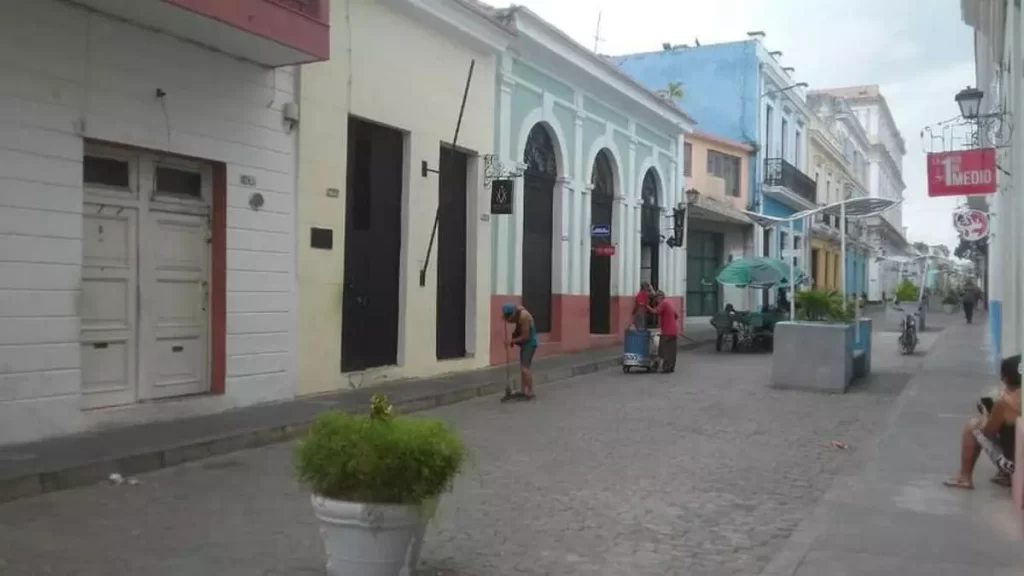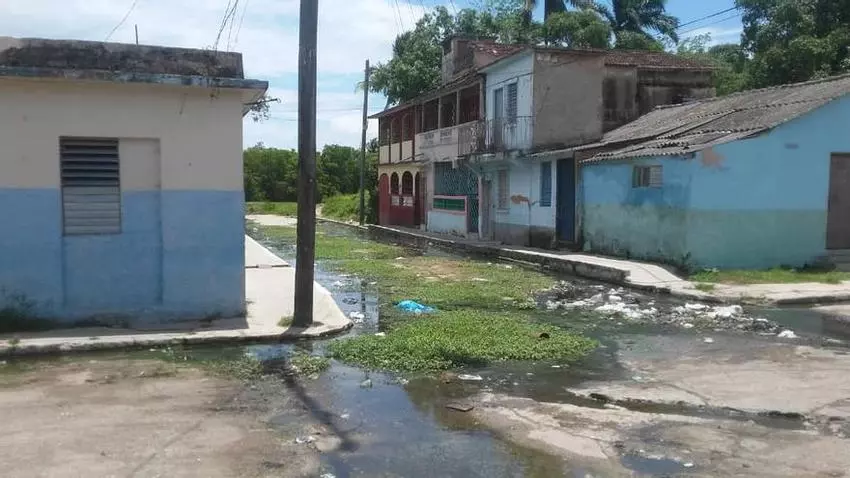“Sometimes plastic bags and papers fly to my door, and the smell is intolerabl, especially at night”

![]() 14ymedio, Julio César Contreras, Matanzas, 10 May 2024 — He took the job to “survive,” but Fernando strives to make Calle Medio, in Matanzas, look impeccable by the end of the day. At 73, he still gets up at dawn and gathers strength to pick up trash from Monday to Sunday in the city centre. His tools: a worn broom and millenary gloves; his mission: to sweep, as much as he is physically able to, all the garbage that piles up in the city.
14ymedio, Julio César Contreras, Matanzas, 10 May 2024 — He took the job to “survive,” but Fernando strives to make Calle Medio, in Matanzas, look impeccable by the end of the day. At 73, he still gets up at dawn and gathers strength to pick up trash from Monday to Sunday in the city centre. His tools: a worn broom and millenary gloves; his mission: to sweep, as much as he is physically able to, all the garbage that piles up in the city.
“If you want to know what the hygienic situation is, all you have to do is walk through Matanzas,” says the sweeper to this newspaper, aware that the view he promises is not pleasant. “Right there is a ‘trash dump’ in the middle of the street that can be compared to a swimming pool, but fixing that is out of my reach.”
According to the man from Matanzas, the working conditions offered by Communal Services are not acceptable at all. “We have to make do with old brooms and dustbins. It is not nice to say it, but they demand a lot from us and we are given very little,” he reflects. To top it off, the job he got with the idea of “shoring up” the insufficient pension he receives, barely earns him another 2,500 pesos per month which is not enough for much.
“I don’t know what we’re going to do if this ends up in a disease or a plague of rats
Fernando is known on Calle Medio, one of the most central streets in the city, where he often sweeps. “This area is quite clean, but other more distant streets, especially in residential neighborhoods, are not as lucky.”
Alina, a housewife living in the Peñas Altas neighborhood, has been complaining to the authorities for weeks about a trash dump that emerged at the corner of her house. “The People’s Power delegate talks and talks, but he doesn’t solve anything and the garbage truck sometimes goes weeks without coming, so I can’t count on that.”
The trash dump of “titanic proportions” has begun to disrupt her daily life. “Sometimes plastic bags and papers fly to my door, and the smell is intolerable, especially at night,” she explains. Neighbors are also unhappy with the situation, “but many have gotten used to it and now it is the neighborhood’s garbage dump, from construction debris to food waste, garbage and junk end up there, then the dumpster divers get them.” However, there is a thought that worries Alina more than the smell and dirt: “I don’t know what we are going to do if this ends up in a disease or a plague of rats.”
In the city’s lower elevation neighborhoods, where water accumulates when it rains and sewers rarely do their job, residents notice the appearance of several gigantic puddles on street corners. Félix, a retired officer of the Ministry of the Interior, suffers this phenomenon first-hand in La Marina neighborhood, where he resides. “When it rains just a little bit, so much water accumulates in front of my house, that I already talk about lakes and not puddles. Sometimes we have to wait more than an hour after the rain to be able to leave and, if then some days go by without rain, that stagnant water becomes green and stinking,” he said.

Felix doesn’t just sit back and watch, and says that on several occasions he has gone to the authorities to report the problem. “I have gone to the Government and the Party to raise the complaint about what is happening. They always tell me that they are going to create a task force to analyze the case. You don’t have to be an expert to know what it takes. The truth is that they do nothing. And then do not express your opinion, because they accuse you of being a counterrevolutionary,” he complains.
At the end of the street, the same puddle that robs Felix of his sleep merges with water from a broken ditch. “I have seen with my own eyes how excrement circulates from one side to the other without anyone caring,” says Carmen who, from the other shore, shares her neighbor’s concern. Her disappointment with the response given to her by the authorities is also evident. “They always tell us that there are no resources, that they are studying the issue, that the blockade* does not allow [a solution]. In short, that they are not going to do anything and that we must solve it ourselves if we can and want to. ”
The dissatisfaction of people in Matanzas with hygiene in the city, once an example of a clean city, extends to other services, such as the scarcity of garbage bins in central areas, the reluctance to hire – as in other provinces – truck drivers and individuals who support the collection of waste, or the hiring of more sweepers like Fernando.
Likewise, with the containers overflowing and the few streets he can cover in one day, the old collector knows that there is very little he can do to prevent the garbage from taking possession of the city once and for all .
Translator’s note: There is, in fact, no US ‘blockade’ on Cuba, but this continues to be the term the Cuban government prefers to apply to the ongoing US embargo. During the Cuban Missile Crisis the US ordered a Naval blockade (which it called a ‘quarantine’) on Cuba in 1962, between 22 October and 20 November of that year. The blockade was lifted when Russia agreed to remove its nuclear missiles from the Island. The embargo had been imposed earlier in the same year in February, and although modified from time to time, it is still in force.
____________
COLLABORATE WITH OUR WORK: The 14ymedio team is committed to practicing serious journalism that reflects Cuba’s reality in all its depth. Thank you for joining us on this long journey. We invite you to continue supporting us by becoming a member of 14ymedio now. Together we can continue transforming journalism in Cuba.
